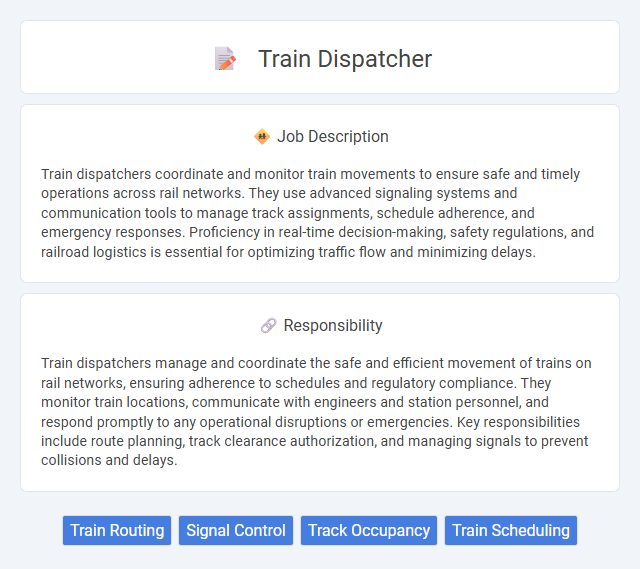
Train dispatchers coordinate and monitor train movements to ensure safe and timely operations across rail networks. They use advanced signaling systems and communication tools to manage track assignments, schedule adherence, and emergency responses. Proficiency in real-time decision-making, safety regulations, and railroad logistics is essential for optimizing traffic flow and minimizing delays.
People who are highly attentive, calm under pressure, and capable of multitasking are likely to be suitable for a Train Dispatcher role. Those who may struggle with stressful environments or have difficulty maintaining concentration for extended periods might find this job challenging. The probability of success increases for individuals with strong decision-making skills and a keen sense of timing.
Qualification
A Train Dispatcher must hold a high school diploma or GED, with many employers preferring candidates who have completed specialized training in railroad operations or transportation safety. Proficiency in communication systems, real-time decision-making, and knowledge of Federal Railroad Administration (FRA) regulations are critical qualifications. Experience with dispatching software and the ability to manage high-stress situations ensure effective coordination of train movements and adherence to safety protocols.
Responsibility
Train dispatchers manage and coordinate the safe and efficient movement of trains on rail networks, ensuring adherence to schedules and regulatory compliance. They monitor train locations, communicate with engineers and station personnel, and respond promptly to any operational disruptions or emergencies. Key responsibilities include route planning, track clearance authorization, and managing signals to prevent collisions and delays.
Benefit
Train Dispatcher positions likely offer benefits such as competitive salaries, opportunities for union membership, and stable employment with consistent scheduling. Workers may gain access to comprehensive health insurance plans, retirement savings options, and paid time off. The role might also provide on-the-job training and career advancement prospects within the rail industry.
Challenge
The role of a Train Dispatcher likely involves significant challenges due to the need for precise coordination and real-time decision-making to ensure safety and efficiency. Managing complex schedules and responding quickly to unexpected disruptions probably demands high levels of concentration and problem-solving skills. The job may often require balancing multiple priorities, which can create a stressful and fast-paced work environment.
Career Advancement
Train dispatchers coordinate railway traffic to ensure safety and efficiency, providing a critical foundation for career growth in transportation management. Mastery of real-time communication systems and advanced scheduling software opens pathways to senior operations roles and railway logistics management. Expertise in emergency response protocols and regulatory compliance positions dispatchers for leadership opportunities within rail system control centers and transportation networks.
Key Terms
Train Routing
Train dispatchers specialize in train routing by coordinating the movement and scheduling of trains to ensure efficient and safe operations across rail networks. They utilize advanced signaling systems and real-time tracking software to optimize train routes, minimize delays, and prevent collisions. Expert knowledge of rail infrastructure, timetables, and traffic control protocols is essential for effective train route management.
Signal Control
A Train Dispatcher specializing in signal control manages railway signals to ensure safe and efficient train movements across the network. This role involves real-time monitoring and coordination of signal systems, preventing collisions by maintaining proper train spacing and adhering to scheduling protocols. Expertise in computerized signal control systems and communication technologies is essential for optimizing traffic flow and minimizing delays.
Track Occupancy
A Train Dispatcher is responsible for monitoring and managing track occupancy to ensure safe and efficient train movement across rail networks. They use advanced signaling systems and real-time data to coordinate track usage, prevent collisions, and minimize delays. Precise tracking of track occupancy is critical for optimizing train schedules and maintaining operational safety.
Train Scheduling
Train dispatchers play a crucial role in coordinating train schedules to ensure timely and safe rail operations. They manage real-time train movements by analyzing track availability, speed restrictions, and maintenance activities to optimize traffic flow. Effective train scheduling by dispatchers minimizes delays and enhances the efficiency of passenger and freight rail services.
 kuljobs.com
kuljobs.com